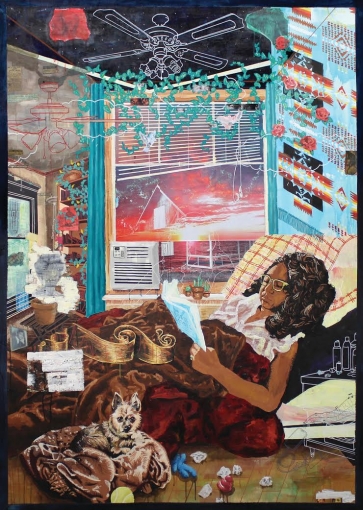Jordan Seaberry
Born and raised on the Southside of Chicago, Jordan first came to Providence to attend Rhode Island School of Design. Alongside his art, he built a career as a grassroots organizer,helping to fight and pass multiple criminal justice reform milestones, including Probation Reform, the Unshackling Pregnant Prisoners Bill, and laying the groundwork for the “Ban the Box” movement here in Rhode Island.He currently works as the Director of Public Policy and Advocacy at the Nonviolence Institute, where he previously worked as the Homicide Victim Advocate. Jordan has received awards for his work within the community from the NAACP, the City of Providence, the RI Governor’s Office, and others. He maintains a painting studio in Providence, and has displayed works at institutions such as the RISD Museum, the deCordova Museum, the Boston Center for the Arts, and exhibition spaces in LA, Chicago, Philadelphia, New York and elsewhere.
Becci Davis
Becci Davis was born on a military installation in Georgia named after General Henry L. Benning of the Confederate States Army. Her birth initiated her family’s first generation after the Civil Rights Act and its fifth generation post-Emancipation. Becci earned her MFA from Lesley University College of Art and Design. In 2018, she was the recipient of the St. Botolph Club Foundation Emerging Artist Award in Visual Art, the Rhode Island State Council on the Arts Fellowship in New Genres, the Providence Public Library Creative Fellowship and the RISD Museum Artist Fellowship. Her creative practice explores the politics of representation, commemoration and monuments, both structural and cultural. It questions how to engage with an archive whose source and steward has historically been the dominant culture that oppressed and exploited her community. Working across disciplines, she collects still and moving images, documents, sound and oral narratives. Using this collection of evidence combined with my own interpretation and response, I construct what Pierre Nora would call realms of memory, devices for remembering people, places, and events. Using these devices along with physically occupying space with my body, I create a new history and personal geography.
Nia Holley (Nipmuc)
Nia Holley is an interdisciplinary artist whose work is deeply influenced by what survival and healing look like within Black and Indigenous communities. Her work ranges from printmaking, ceramics, metalsmithing, and traditional arts to bringing tribal communities together around food justice, agroecology, land, & history. She strives to cultivate relationships across tribal borders to rebuild a more inclusive and historical process of kinship and survival. She has worked as an outreach and project coordinator with Gedakina, a Native-led grassroots organization, and has been actively involved in Nipmuc programs since she could walk and talk. Nia is a co-founder of the Eastern Woodlands Rematriation collective. She currently works transcribing Native American petitions at the Radcliffe Institute at Harvard University.
Sherenté Harris (Narragansett)
Sherenté Mishitashin Harris intertwines the stories of his cultural path with his Two Spirit identity, to evoke emotion, spark dialogue, and amplify ideologies that are too often silenced. Sherenté’s efforts oppose the prolonged issue of Indigenous Invisibility. Allowing his stories to manifest through writing, speaking, performance, and visual art, Sherenté can expand the audience of his message, educating and creating change within his communities. Sherenté is a member of the Narragansett Tribal Nation. Named a 2019 LGBT Icon, Sherenté is also a 2018 Presidential and Rhode Island Foundation Carter Roger Williams Scholar and is currently enrolled in a five year dual degree program at Brown University and Rhode Island School of Design.
